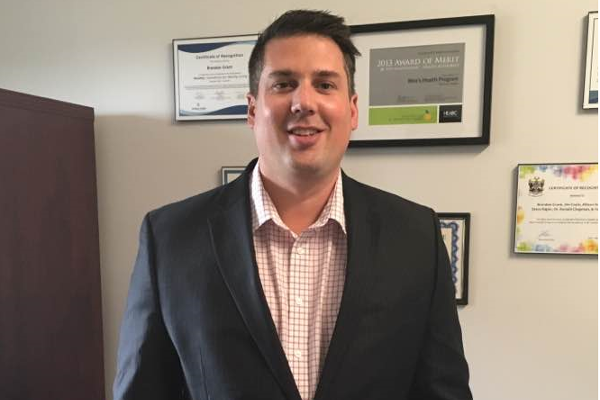
Leading innovation in public sectors across Canada
Innovation is key for this Johnson Shoyama MPA grad.
By Bev Fast, Saskatoon-based freelance writerUndaunted by Distance
Ask Brandon Grant (MPA’11) where he’s from and he’ll say, “a little bit of everywhere.” His father was a member of the RCMP, so the family lived in Ontario, Saskatchewan, Alberta and British Columbia before settling on the east coast. Brandon earned a bachelor’s degree from St. Mary’s University in Halifax—and then promptly moved to northern B.C.
The 5,390 km cross-country trek marks the beginning of a remarkable career journey. In 2007, Brandon took a position as youth program coordinator at the Nawican Friendship Centre in Dawson Creek. He helped establish a program for at-risk youth and was soon promoted to executive director. In 2008, he moved to Prince George to pursue a Master’s Degree in Social Work at the University of Northern British Columbia, while continuing to work on the frontlines in the non profit sector.
“I started looking at public administration and policy programs because I wanted a better understanding of how government functioned, how it could support my work,” Brandon says. “I started thinking about shifting into government, because I felt I could have more impact.”
A New Focus
After looking at programs across the country, Brandon enrolled in the Master of Public Administration program at Johnson Shoyama Graduate School of Public Policy in 2010. “I was married by then, and my wife and I were both accepted into the program,” he says. “We both worked during the program, so it was very helpful to have her on the journey—we kept each other motivated.”
Brandon has good memories of his time at JSGS. Like many alumni, he says the governance and administration course (usually the first course new students take) was one of his favourites. He also appreciated the real-world experience of the faculty and guest speakers.
“The guest speakers are a key strength of the program, in my opinion,” Brandon says. “We had former premiers, ministers, deputy and assistant deputy ministers as guest speakers. Their practical experience provided insight into government, especially in the context of how decisions are made. That was valuable.”
Participating in the case competition was another highlight. Teams analyze a real-world scenario and then craft a set of plausible policy options and one recommendation. During a day-long case competition, each team presents their recommendation and defends it in front of a panel of judges made up of senior public servants. “You have to condense key learnings into clear, concise statements and then answer questions. You’re getting grilled by the panel, so you have to think quickly on your feet,” Brandon says. “That type of pressure is a good teacher, because that’s the kind of environment you work in with government.”
Back to B.C.
After completing his MPA in June 2011, Brandon headed back to in Prince George to take a position as the Men’s Health Coordinator for Northern Health BC. “It was a great job,” Brandon says. “No other health authority had developed a specific program for men’s health, so we had to develop a program from the ground up. It was an opportunity to do some innovative things, and we had good success.”
Brandon oversaw the design, planning, implementation and evaluation of the Men’s Health strategic plan. His duties included engaging internal and external stakeholders, establishing a men’s health coalition, linking related networks, initiatives and policies, implementing a communications strategy, supporting implementation and evaluation of policy changes, brokering resources for priority activities and tracking progress. He and his team were recognized by the Health Employers Association of British Columbia with an Award of Merit for Top Innovation in a Health Authority.
In 2013, Brandon accepted a new challenge: director of income assistance for the Government of Nunavut’s Department of Family Services. Instead of being responsible for one program, he was now responsible for the majority of Nunavut’s income assistance programs and services, including social assistance and childcare, seniors’ and workers’ benefits and supplements.
“Nunavut accounts for approximately one-fifth of Canada’s land mass, so about the size of western Europe, but there are only 26 isolated communities and about 40% of the population is on income assistance, so the division plays an important role,” Brandon says.
When he started, the government was beginning an initiative to transform the department with an integrated case management approach to the delivery of family social services, career development and income assistance programs. A year into the posting, Brandon was promoted to executive director. “It was interesting work. The people are incredible, and the Nunavut government is very willing to be innovative. The system is still evolving, but we accomplished a lot in the time I was there.”
Going Home
In February 2016, Brandon made yet another cross-country trek to pursue a career opportunity as executive director, Employment Support and Income Assistance (ESIA), for the Government of Nova Scotia.
“It’s a bit of a homecoming for me, but also an opportunity to do interesting work in employment support. We’ve got a great team in place and we’re currently undertaking a multi-year transformation project to see how the ESIA can do things differently to better meet the needs of our clients and improve the system overall,” Brandon says. “It’s similar to my experience in the North, in that we’re looking for innovative solutions to complex problems. There’s a desire to do things differently, just as there is in Nunavut. It’s an exciting opportunity to have a real impact on the people we serve—that’s one of the things that has always made my job worthwhile.
For now, Brandon appears settled. “I think I’ll be staying in government. The work appeals to me. You have the opportunity to work with incredibly smart, incredibly motivated people who are working towards better services and better programs. You also see the impact you have on people’s lives—that’s one of the true benefits of working in public service.”

